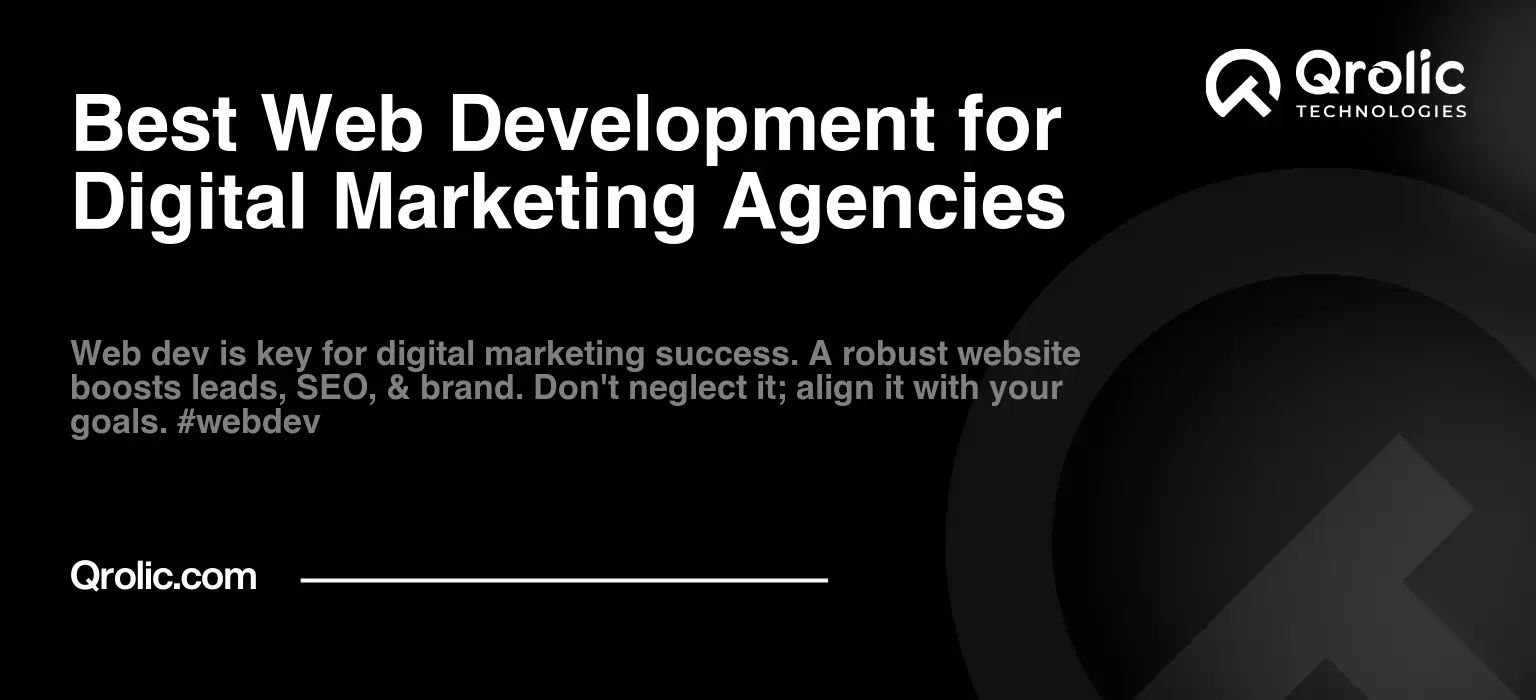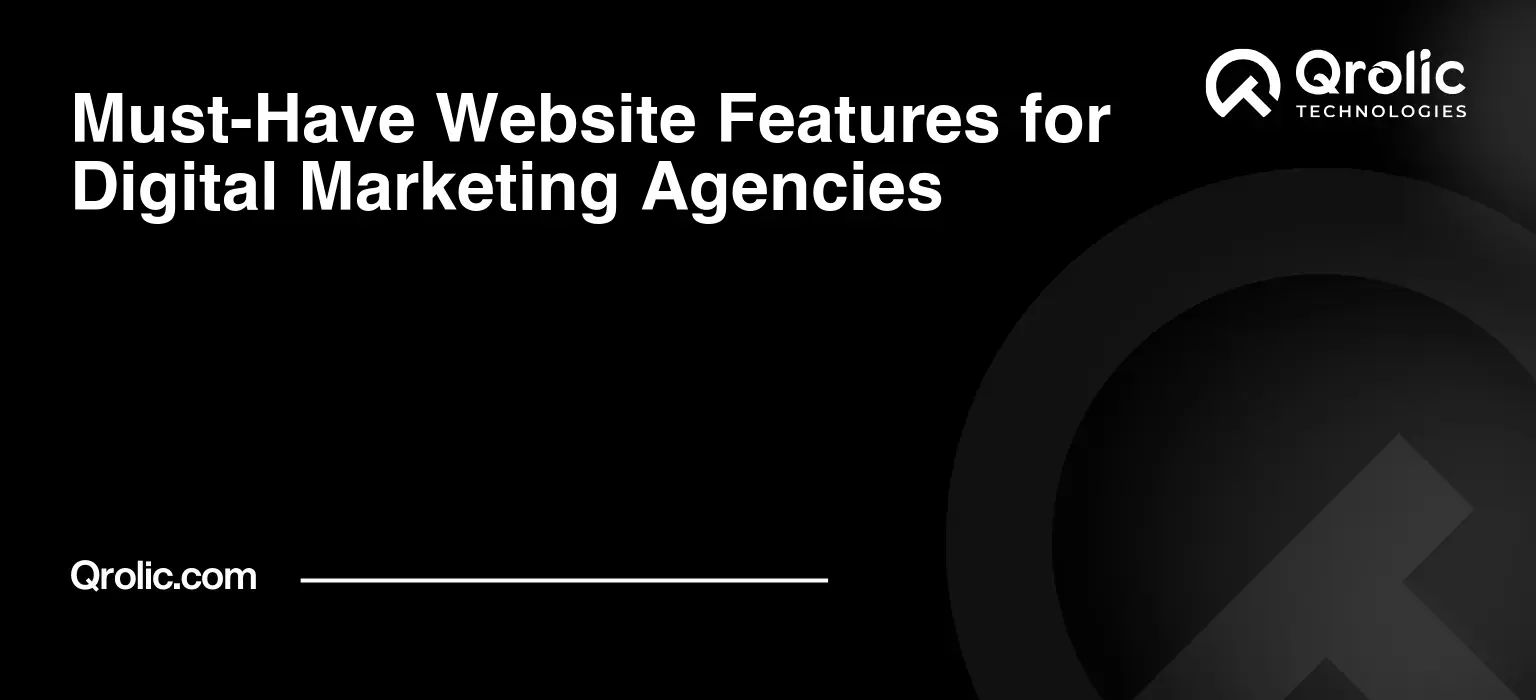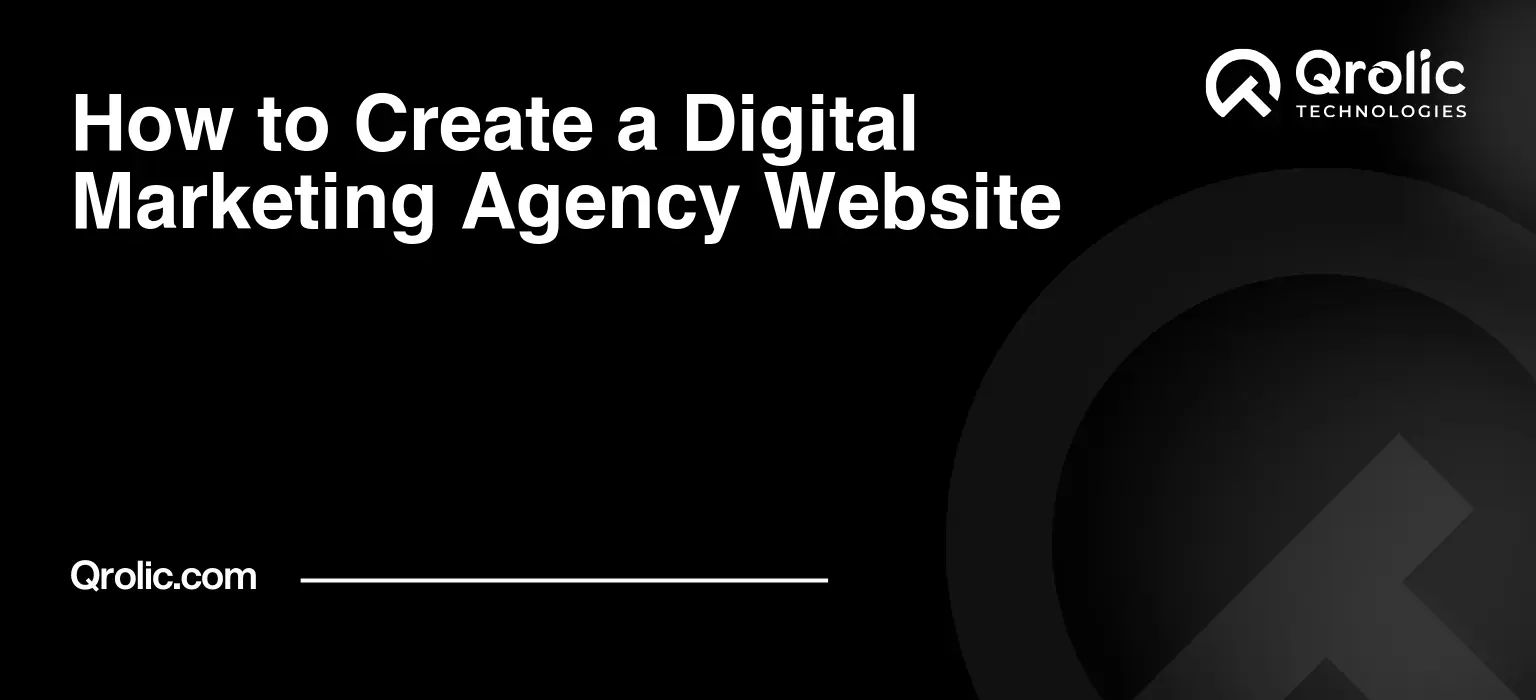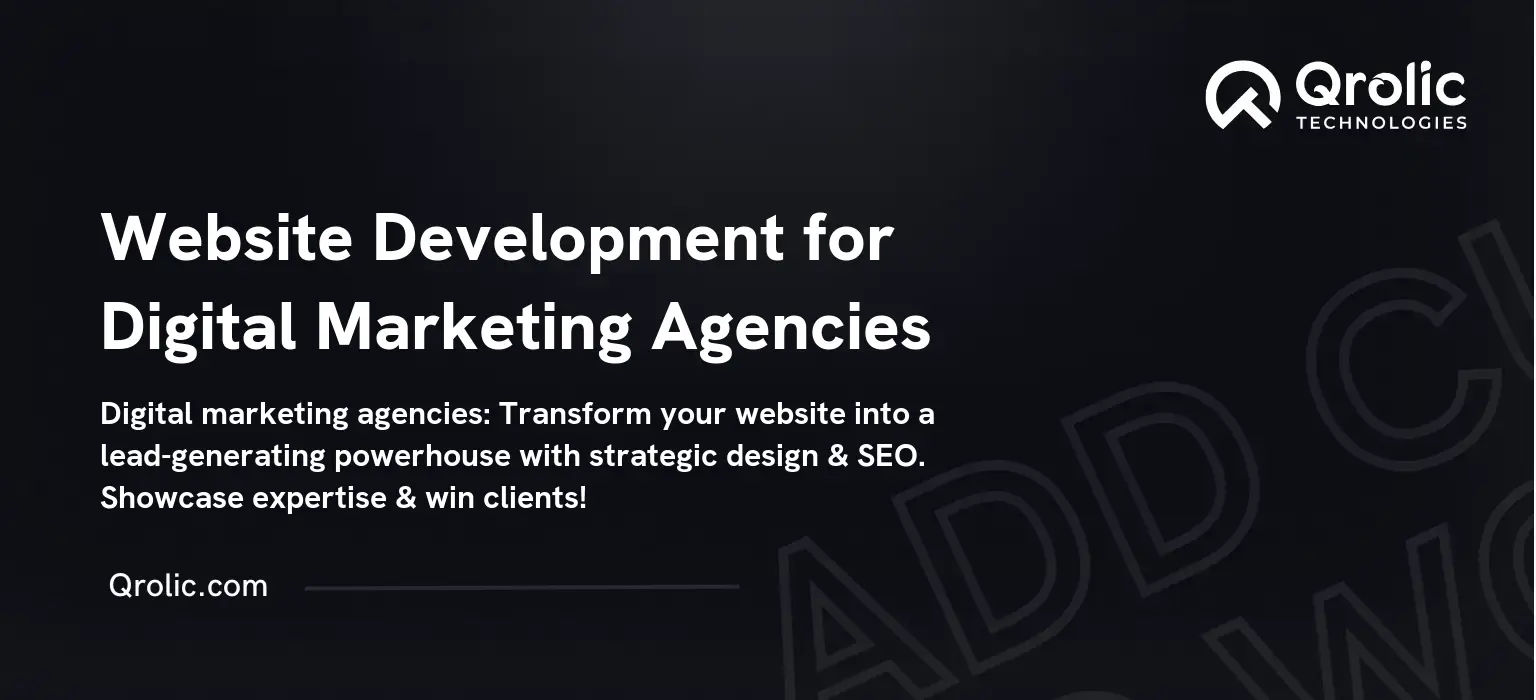Quick Summary:
- Web development powers digital marketing success.
- Strategic websites boost leads, SEO, and brand.
- Prioritize UX, SEO, and marketing tool integration.
- Outsourcing web development can be a smart move.
Table of Contents
- Why Web Development is the Unsung Hero of Digital Marketing Success
- The Crucial Link: Web Development and Digital Marketing Objectives
- The Dire Consequences of Neglecting Website Development
- Key Web Development Elements for Digital Marketing Agencies
- 1. Strategic Design and User Experience (UX)
- 2. SEO-Friendly Development
- 3. Content Management Systems (CMS) and Flexibility
- 4. Integration with Marketing Tools
- 5. Security and Performance
- The Web Development Process: A Step-by-Step Guide
- Outsourcing Web Development: When to Partner with Experts
- Choosing the Right Web Development Partner
- Qrolic Technologies: Your Partner in Web Development Excellence
- Conclusion: Web Development is an Investment in Your Agency’s Future
Why Web Development is the Unsung Hero of Digital Marketing Success
Digital marketing agencies are the engines of online growth for countless businesses. They craft compelling campaigns, optimize for search engines, and engage audiences across various platforms. But what often operates behind the scenes, powering these efforts, is web development. It’s the often-unseen force that translates marketing strategies into tangible, user-friendly experiences. Without a robust and strategically designed website, even the most brilliant marketing plans can fall flat.
Think of your website as the central hub of all your marketing activities. It’s where potential clients land after clicking on your ads, where leads convert into customers, and where your brand story is told. If this hub is poorly constructed, slow, or difficult to navigate, you’re essentially throwing away the effort and resources invested in digital marketing.
The Crucial Link: Web Development and Digital Marketing Objectives
Web development isn’t just about coding; it’s about strategically aligning technical expertise with your agency’s digital marketing goals. A well-developed website is fundamental to achieving key marketing objectives, including:
- Lead Generation: Capturing leads is a core function of any digital marketing strategy. Your website needs to be designed with lead capture in mind, using clear calls to action, strategic form placements, and a user-friendly design that encourages conversions.
- Brand Building: Your website is often the first interaction a potential client has with your agency. It’s your online storefront and needs to reflect your brand’s identity and values, establishing trust and credibility.
- Search Engine Optimization (SEO): A website built with SEO best practices in mind is crucial for visibility. Technical SEO elements like site speed, mobile responsiveness, and schema markup significantly impact your rankings.
- User Experience (UX): A positive user experience is vital for engagement and conversions. A website that is easy to navigate, loads quickly, and is visually appealing ensures users stay longer and are more likely to become clients.
- Content Marketing: Your website serves as the primary platform for your content marketing efforts. A well-structured blog, resource library, and case studies help establish your agency as an industry authority.
The Dire Consequences of Neglecting Website Development
Imagine investing heavily in a social media campaign that drives significant traffic to your website, only to see that traffic bounce away due to slow loading times, a confusing layout, or lack of mobile optimization. This is a common scenario when agencies overlook the crucial role of web development in their overall strategy. Neglecting website development can lead to:
- Lost leads and conversions: A clunky website discourages users from interacting and converting, meaning you lose potential clients.
- Poor SEO rankings: A technically flawed website will struggle to rank well in search results, making it difficult for potential clients to find your agency.
- Damaged brand reputation: A poorly designed or unresponsive website creates a negative first impression, damaging your agency’s credibility.
- Wasted marketing budget: If you’re driving traffic to a website that isn’t built to convert, your marketing spend is essentially being thrown away.
- Frustrated users: A poor user experience leads to user frustration, making them unlikely to engage with your brand.
Key Web Development Elements for Digital Marketing Agencies
So, what elements are essential for web development success for digital marketing agencies? It’s about combining technical proficiency with marketing understanding. Here are the core areas you should focus on:
1. Strategic Design and User Experience (UX)
Your website needs to be more than just pretty; it needs to be functional, intuitive, and focused on the user’s needs.
- Clear Navigation: Users should easily find the information they’re looking for. This means a simple, well-organized menu, clear categories, and intuitive page layouts.
- Mobile-First Design: With the majority of users accessing the internet via mobile devices, your website must be fully responsive, providing an optimal experience on all devices, from smartphones to tablets.
- Engaging Visuals: High-quality images, videos, and graphics enhance user engagement. Visuals should complement your content and reinforce your brand identity.
- Compelling Calls to Action (CTAs): Strategically placed CTAs guide users towards desired actions, like filling out a contact form, downloading a resource, or requesting a consultation.
- Fast Loading Speed: Slow loading times are a major turnoff for users. Optimize images, use caching, and choose a reliable hosting provider to ensure your website loads quickly.
- Accessibility: Your website should be accessible to all users, including those with disabilities, adhering to web accessibility guidelines (WCAG).
2. SEO-Friendly Development
Building your website with SEO in mind from the start is crucial for maximizing organic visibility.
- Clean Code: Clean, well-structured code helps search engine crawlers easily understand your website’s content.
- Keyword Research and Implementation: Conduct thorough keyword research and incorporate relevant keywords naturally into your website content, meta descriptions, and image alt tags.
- Optimized URLs: Use descriptive and SEO-friendly URLs that include target keywords.
- Schema Markup: Implementing schema markup helps search engines understand the context of your content, potentially leading to richer search results.
- Site Speed Optimization: As mentioned before, fast loading times are essential for both UX and SEO.
- Mobile Optimization: Mobile responsiveness is a significant ranking factor for search engines.
- Internal Linking: Link relevant pages within your website to help users and search engine crawlers navigate your content.
3. Content Management Systems (CMS) and Flexibility
Choosing the right CMS is critical for managing your website’s content efficiently.
- User-Friendly Interface: Opt for a CMS with an intuitive interface that is easy for your team to manage content, add pages, and make updates without needing extensive technical skills.
- Scalability: Your CMS should be able to handle future growth and accommodate new features and content without performance issues.
- Customization: Choose a CMS that allows for customization to match your brand’s identity and integrate with other marketing tools. Popular options include wordpress, Drupal, and Craft CMS.
- Security: Prioritize a CMS with strong security features to protect your website and data.
- Plugins and Extensions: The CMS should support plugins and extensions that enhance functionality and streamline workflows.
4. Integration with Marketing Tools
Your website shouldn’t operate in a silo. It needs to be seamlessly integrated with your other marketing tools.
- CRM Integration: Connect your website to your CRM system to track leads, manage customer data, and streamline your sales process.
- Email Marketing Platform Integration: Integrate your website with your email marketing platform to automate email list growth and improve engagement.
- Analytics Tools: Connect your website to analytics tools like Google Analytics to track user behavior, monitor key metrics, and gain insights that drive informed decisions.
- Social Media Integration: Integrate social media platforms to make it easy for users to share content and connect with your agency.
- Marketing Automation: Use marketing automation tools to automate repetitive tasks, nurture leads, and improve conversion rates.
5. Security and Performance
Security and performance are non-negotiable for any website, especially one that acts as a brand’s main communication platform.
- SSL Certificate: An SSL certificate ensures data security and builds trust with visitors.
- Regular Backups: Implement regular website backups to prevent data loss.
- Security Updates: Keep your CMS and plugins updated to fix security vulnerabilities.
- Performance Monitoring: Regularly monitor website performance using tools like Google PageSpeed Insights and GTmetrix and address issues proactively.
- Reliable Hosting: Choose a hosting provider with a proven track record for reliability and uptime.
The Web Development Process: A Step-by-Step Guide
Let’s dive into the process of creating a website for a digital marketing agency. It’s a collaborative effort, blending creativity and strategy with technical execution.
Planning and Discovery:
- Define Objectives: Clearly outline the goals for your website. What do you want to achieve? (e.g., increased leads, brand awareness, establishing authority).
- Target Audience: Understand your target audience. Who are you trying to reach? What are their needs, pain points, and expectations?
- Competitive Analysis: Research your competitors’ websites. What are their strengths and weaknesses? How can you differentiate yourself?
- Content Audit: Review existing website content. What needs updating or improving? What new content needs to be created?
- Sitemap Creation: Plan the structure of your website. What are the main pages, and how will they be organized?
- Technology Stack: Decide on the technologies to use, like the CMS, programming languages, and third-party tools.
Design and Wireframing:
- Wireframing: Create basic page layouts or wireframes to outline the structure and content of each page. This phase focuses on functionality rather than aesthetics.
- Visual Design: Develop the visual design elements, including colors, typography, imagery, and branding.
- User Interface (UI) Design: Create the user interface, ensuring the website is intuitive and easy to use.
- Mobile Mockups: Design the website for mobile devices to ensure optimal viewing experience.
Development:
- Front-End Development: Develop the front-end of the website using HTML, CSS, and JavaScript. This is what users see and interact with in their browsers.
- Back-End Development: Develop the back-end of the website, including server-side logic, database management, and CMS integration.
- Testing: Conduct rigorous testing throughout the development process to ensure all features function correctly and the site is compatible across various browsers and devices.
- Security Implementation: Implement security measures like SSL certificates and security updates.
Content Population and Optimization:
- Content Creation: Create high-quality, engaging content that is optimized for SEO.
- Content Upload: Upload all content into the website, ensuring it is properly formatted and aligned with the design.
- SEO Optimization: Optimize website content for target keywords, implement schema markup, and ensure site structure is SEO-friendly.
- Performance Optimization: Implement strategies to improve site loading speed, including image optimization and code minification.
Launch and Ongoing Maintenance:
- Website Launch: Launch the website after thorough testing.
- Performance Monitoring: Monitor the website’s performance using analytics tools and identify areas for improvement.
- Security Updates: Implement regular security updates to protect your website.
- Content Updates: Keep your content fresh and relevant by regularly updating blog posts, case studies, and other resources.
- Continuous Improvement: Analyze website performance and user feedback to make continuous improvements to your website.
Outsourcing Web Development: When to Partner with Experts
While some digital marketing agencies may have in-house web development capabilities, there are many instances when outsourcing to a dedicated team of experts makes strategic sense. Here’s when outsourcing is usually the best option:
- Lack of In-House Expertise: If your agency lacks the necessary in-house web development expertise, outsourcing provides access to a skilled team with the required experience.
- Complex Projects: For complex website projects that require specialized technical skills or unique functionalities, partnering with a web development agency that specializes in these areas can be crucial.
- Scalability: Outsourcing enables you to scale your web development team up or down as needed, depending on project requirements.
- Cost-Effectiveness: Outsourcing can be more cost-effective than hiring a full-time in-house team, especially for agencies that do not have consistent web development needs.
- Focus on Core Competencies: By outsourcing web development, your agency can free up internal resources to focus on core business activities, such as marketing strategy and client management.
- Time Constraints: If you need a website developed quickly, an outsourcing partner can help expedite the process.
Choosing the Right Web Development Partner
If you choose to outsource, selecting the right partner is essential for success. Look for a partner that:
- Has a Proven Track Record: Examine their portfolio of past projects and check their testimonials.
- Has Relevant Experience: Choose a partner with experience building websites for digital marketing agencies, as they’ll have a deeper understanding of the industry’s specific needs.
- Understands Your Objectives: Find a partner that takes the time to understand your business, goals, and target audience.
- Offers Transparent Communication: Choose a partner that provides clear, consistent communication throughout the development process.
- Is Committed to Quality: Look for a partner that is dedicated to delivering high-quality work.
- Provides Ongoing Support: Choose a partner that offers ongoing maintenance and support after the project launch.
Qrolic Technologies: Your Partner in Web Development Excellence
When it comes to partnering with a reliable and experienced web development company that truly understands the needs of digital marketing agencies, look no further than Qrolic Technologies.
Qrolic Technologies (https://qrolic.com/) offers a comprehensive suite of web development services tailored to elevate the online presence of digital marketing agencies. Their team of skilled professionals understands the critical link between web development and digital marketing success. They go beyond simply building websites; they build strategically engineered platforms that drive results.
Here’s how Qrolic Technologies can help your digital marketing agency:
- Custom Web Development: They build custom websites tailored to your brand identity, target audience, and specific marketing goals, ensuring a unique and effective online presence.
- Responsive and Mobile-First Design: They prioritize mobile-first design, guaranteeing optimal user experiences across all devices, which is essential for conversions and search engine visibility.
- SEO Optimization: Their developers are well-versed in SEO best practices and build websites that are technically optimized to rank high in search results, enhancing your agency’s online visibility.
- Performance-Driven Development: They optimize websites for fast loading times and seamless user experience, improving engagement and conversions, ultimately boosting your marketing campaign.
- Seamless Integration with Marketing Tools: They have expertise in integrating websites with various marketing platforms, including CRM systems, email marketing software, and analytics tools, streamlining your workflows and enhancing data analysis.
- Content Management Systems (CMS): Qrolic Technologies uses robust and user-friendly CMS platforms to empower your team to manage content easily, making real-time updates, and allowing dynamic growth.
- Ongoing Support and Maintenance: They offer ongoing support and maintenance services to ensure your website remains secure, up-to-date, and performs optimally, giving you peace of mind.
- Proven Track Record: They possess a proven track record of successfully developing websites for digital marketing agencies and possess the expertise you need to drive growth, which showcases their commitment to excellence and client success.
By partnering with Qrolic Technologies, your digital marketing agency can gain a competitive advantage through a strategically designed, high-performing website that drives results and elevates your brand’s online presence. They are not just a web development provider; they are a strategic partner committed to your success.
Conclusion: Web Development is an Investment in Your Agency’s Future
In the competitive landscape of digital marketing, a strong website is no longer optional, it’s a cornerstone of success. Digital marketing agencies cannot afford to overlook the crucial role of strategic web development. It’s the foundation upon which all other digital marketing efforts are built.
By investing in a well-designed, SEO-optimized, user-friendly website, digital marketing agencies can:
- Generate more leads
- Increase conversions
- Build brand credibility
- Improve search engine rankings
- Enhance user experience
- Maximize their marketing ROI
Whether you decide to build your website in-house or partner with an experienced web development agency like Qrolic Technologies, make sure that your web development strategy aligns seamlessly with your overall digital marketing objectives. It’s an investment that will pay off significantly in the long run, helping your agency attract new clients, grow your business, and solidify your position as a leader in the digital marketing industry. The future of your agency’s success is deeply intertwined with the quality and strategic impact of your website.









